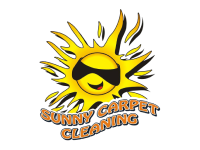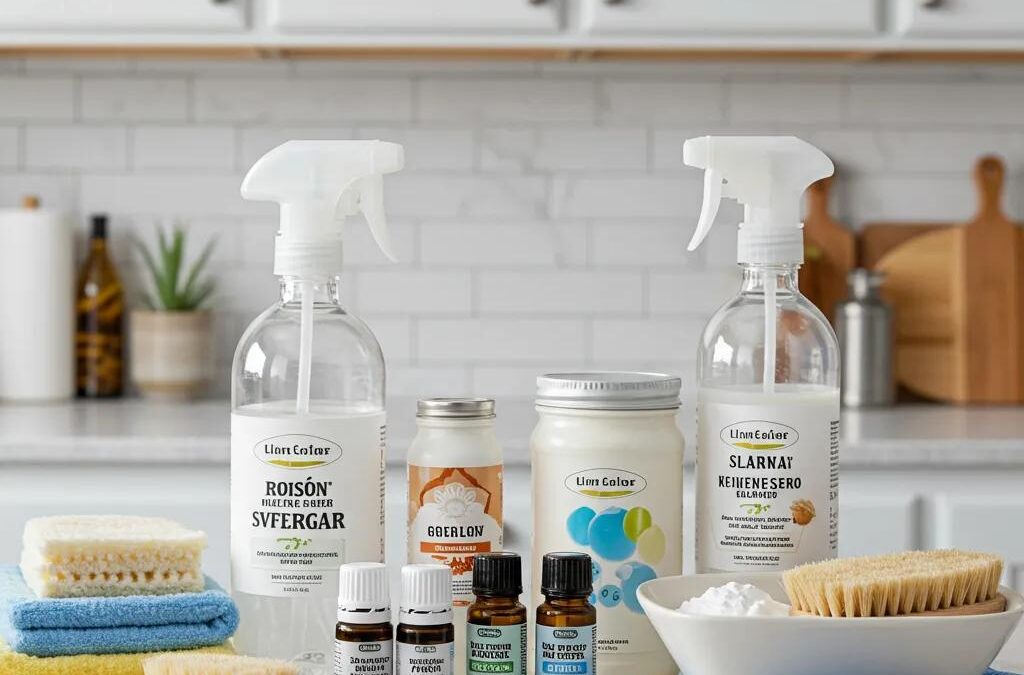Discover how common kitchen staples can become your go-to for powerful, plant-based cleaners that tackle grease, banish odors, and keep your family safe. This guide walks you through simple recipes for every area of your home, offers insights into eco-friendly carpet care, explains the magic behind green ingredients, and shares tips for safe storage and local sourcing in Colorado. You’ll learn which ingredients naturally disinfect and why they work, how to conquer stubborn carpet stains the natural way, the positive environmental impact of DIY cleaners, and when calling Sunny Carpet & Upholstery Cleaning for professional cleaning service guarantees outstanding results. By the end, you’ll have sustainable cleaning routines that save you money, reduce your exposure to harsh chemicals, and contribute to a healthier home—all while understanding how professional cleaning services perfectly complement your natural efforts.
What Are the Best Homemade Natural Cleaning Recipes for Every Room?
Natural cleaning recipes combine plant-derived ingredients and gentle minerals to effectively clean and sanitize without harsh chemicals. These solutions harness the power of vinegar’s acetic acid and baking soda’s gentle scrubbing granules to lift away dirt and neutralize odors, creating a safer environment for active households. By tailoring recipes to each room, you can utilize specific cleaning actions—like degreasing for kitchens, antimicrobial power for bathrooms, streak-free shine for windows, and gentle care for floors—while minimizing your environmental impact.
Which Natural Ingredients Are Essential for DIY Cleaners?
Key green cleaning ingredients possess unique chemical properties that drive their cleaning power and contribute to their pleasant scents. White vinegar, with its acetic acid, effectively breaks down grease and disinfects. Baking soda, or sodium bicarbonate, acts as a gentle abrasive for scrubbing and a powerful odor absorber. Essential oils, such as lemon or tea tree, add natural antimicrobial benefits and refreshing fragrances. Castile soap, made from plant-based oils, contains surfactants that help emulsify grease, while hydrogen peroxide works as an oxidizer to tackle stains and kill bacteria.
DIY Cleaning: Vinegar and Baking Soda for Safe Disinfection Certain ingredients, such as vinegar and baking soda, are purported to be safer cleaners and disinfectants, including DIY formulations. We evaluated both performance characteristics. The effectiveness of three home products in cleaning and disinfection of Staphylococcus aureus and Escherichia coli on home environmental surfaces.
How Do You Make an All-Purpose Natural Cleaner?
An all-purpose cleaner effectively tackles common household grime through simple acid-base reactions and the action of surfactants.
- In a spray bottle, combine 1 cup of distilled water, 1 cup of white vinegar, and 1 teaspoon of liquid Castile soap.
- Add 10 drops of lemon essential oil for an extra boost of grease-cutting power and a fresh scent.
- Give it a gentle shake before each use and spray onto counters, cabinets, and other sealed surfaces.
This simple mixture cleans surfaces, disinfects thanks to the acetic acid, and leaves behind a pleasant, natural citrus aroma.
What Are Simple Recipes for Kitchen and Bathroom Cleaners?
For kitchen counters and stovetops, create a powerful scrubbing paste by mixing 2 tablespoons of baking soda with 1 cup of water. This paste is excellent for tackling baked-on messes.
In the bathroom, blend ½ cup of hydrogen peroxide with 2 cups of water and a few drops of tea tree oil. This solution is perfect for sanitizing grout and glass surfaces. These recipes utilize mild abrasives and oxidation to keep your surfaces hygienic without relying on synthetic chemicals.
How Can You Create Effective Window and Floor Cleaners Naturally?
Achieve streak-free windows with a solution made from 2 cups of water, ¼ cup of white vinegar, and 1 tablespoon of rubbing alcohol. This mixture evaporates quickly and effectively dissolves residue. For hardwood or tile floors, combine ½ cup of Castile soap with 1 gallon of warm water and 10 drops of lavender oil. This blend cuts through grease while protecting your floor’s finish. These formulas strike a balance between effective cleaning and surface safety.
How Do You Make Natural Carpet Cleaner Recipes That Work?
DIY carpet cleaners utilize acid-base reactions and odor-absorbing minerals to safely lift stains and refresh carpet fibers. Baking soda is excellent for neutralizing odors, while vinegar helps break down organic spots. A touch of mild dish soap can emulsify oils before rinsing. These methods reduce your dependence on chemical solvents, helping to protect your indoor air quality and extend your carpet’s lifespan when used properly.
What Are the Best DIY Natural Carpet Stain Removers?
- For tough stains like coffee or wine, generously sprinkle baking soda over the damp spot. It will absorb moisture and odors. Then, spray a 1:1 solution of vinegar and water to help lift the pigment before blotting the area.
- Grease spots can be treated with a paste made from baking soda and Castile soap. Let it sit for about 15 minutes, then gently work it in and vacuum it up.
These natural methods effectively break down stains without the need for harsh solvents.
How to Prepare Homemade Carpet Shampoo for Machines?
Create a machine-safe natural shampoo by blending plant-based surfactants with gentle oxygen bleach precursors. Mix 1 cup of Castile soap, ½ cup of baking soda, and 1 tablespoon of hydrogen peroxide into 4 cups of warm water. Use this solution in your carpet cleaner on a gentle cycle for a deep clean that leaves fibers free of dirt-attracting chemical residues.
Which Pet-Safe Homemade Carpet Deodorizers Are Effective?
Pet odors are no match for the odor-neutralizing power of bicarbonate granules, which effectively break down ammonia and other organic acids. Sprinkle ½ cup of baking soda mixed with 5 drops of lavender or eucalyptus essential oil over your carpet. Let it sit for 30 minutes, then vacuum thoroughly. This method refreshes your carpet fibers and helps prevent pets from returning to soiled spots, all without posing a risk to their health.
When Should You Consider Professional Carpet Cleaning Instead?
While DIY methods are great for surface stains and everyday odors, deeply embedded dirt and heavy wear often require professional attention. Professional carpet cleaning services uses advanced techniques like hot water extraction to thoroughly flush out allergens, oils, and grime that homemade cleaners simply can’t reach. This ensures the long-term health of your carpet fibers and restores their vibrancy far beyond what routine DIY maintenance can achieve.
What Are the Health and Environmental Benefits of Using Eco-Friendly Cleaning Solutions?
Eco-friendly cleaners significantly reduce your exposure to volatile organic compounds (VOCs) and toxic residues, which promotes better respiratory health and minimizes chemical risks for children and pets. They are made with biodegradable ingredients that break down harmlessly, preventing contamination of waterways and reducing harmful landfill leachate. By adopting green cleaning practices, you embrace a more sustainable lifestyle, cutting down on plastic waste and the carbon emissions associated with manufacturing and transporting synthetic products.
How Do Natural Cleaners Promote a Healthier Indoor Environment?
Natural cleaners eliminate harsh volatile compounds like ammonia and formaldehyde, which can trigger headaches and allergic reactions. Their mild pH balance helps prevent skin irritation and maintains indoor humidity levels, contributing to easier breathing and fewer asthma triggers. By cleaning with ingredients like vinegar, baking soda, and plant-derived surfactants, you cultivate a safer atmosphere, free from the byproducts of harsh chemicals.
An Examination of Ingredients in Consumer Cleaning Products… the comprehensive set of ingredients utilized in consumer cleaning products … to assess the application of these cleaning product ingredients, an inventory was compiled … encompassing all ingredients listed on the Ingredient Inventory …Cleaning product ingredient safety: what is the current state of availability of information regarding ingredients in products and their function?, PC DeLeo, 2018
What Environmental Advantages Do Homemade Cleaners Offer?
Homemade cleaning solutions help reduce plastic packaging waste because you can reuse spray bottles. Plus, their biodegradable ingredients break down quickly in wastewater treatment systems. The production process for simple ingredients like vinegar and baking soda requires far less energy and processing compared to petrochemical derivatives, leading to lower greenhouse gas emissions. Choosing DIY recipes supports a circular economy and helps divert waste from landfills.
Are Natural Cleaning Solutions Safe for Pets and Children?
When prepared correctly, green cleaners pose minimal toxicity risks. Vinegar and baking soda are generally safe and don’t present systemic hazards. Essential oils, when diluted to less than 1% concentration, are unlikely to cause skin or respiratory irritation. Always perform a spot test on surfaces, ensure good ventilation when cleaning, and store all solutions out of reach to guarantee the safety of your youngest and most vulnerable family members.
Which Natural Cleaning Ingredients Should You Use and Why?
Effective green cleaners rely on ingredients with proven cleaning mechanisms: acids to dissolve mineral buildup, bases to lift oils, surfactants to emulsify grease, and oxidizers to break down stains. Understanding the specific function of each ingredient ensures your recipes target particular types of dirt and surfaces without causing unintended damage.
| Ingredient | Primary Property | Key Function |
|---|---|---|
| White Vinegar | Acetic acid concentration | Degreases, disinfects, deodorizes |
| Baking Soda | Alkaline abrasive | Scrubs, neutralizes odors |
| Castile Soap | Plant-derived surfactant | Emulsifies oils |
| Hydrogen Peroxide | Oxidizing agent | Whitens, sanitizes |
| Lemon Juice | Natural citric acid | Cuts through grease, brightens |
| Essential Oils | Antimicrobial compounds | Adds fragrance, inhibits microbes |
These foundational ingredients allow you to create targeted, eco-friendly formulas that address a wide range of cleaning challenges.
What Are the Properties and Uses of White Vinegar in Cleaning?
White vinegar, with its 5% acetic acid concentration, is excellent at dissolving hard water stains, cutting through grease, and disrupting the cell walls of bacteria. It’s perfect for shining up kettles and faucets, brightening fabrics, and removing soap scum when diluted with water—making it a truly versatile disinfectant and deodorizer for every room in your home.
How Does Baking Soda Function as a Natural Cleaner?
Baking soda’s mild alkalinity and unique crystalline structure provide a gentle abrasive action that lifts dirt effectively without scratching surfaces. Its ability to neutralize pH levels helps absorb acidic odors and balance cleaning solutions, making it ideal for scrubbing sinks, deodorizing carpets, and freshening up your refrigerator.
What Role Do Essential Oils Play in Homemade Cleaners?
Essential oils like tea tree, lavender, and lemon contain natural compounds such as terpenes and phenols that help inhibit microbial growth and impart pleasant, natural aromas. When used in dilutions below 1%, they can boost cleaning power, help preserve your natural ingredients, and leave behind a lasting, plant-based scent without the need for synthetic fragrances.
How Are Castile Soap, Lemon Juice, and Hydrogen Peroxide Used in Recipes?
Castile soap’s natural surfactants are perfect for emulsifying greasy residues in all-purpose sprays and floor cleaners. Lemon juice adds extra citric acid to help cut through grease and brighten grout lines. Hydrogen peroxide’s oxidizing power is effective at removing organic stains from fabrics and grout. Together, these ingredients form powerful, multi-action cleaners that can effectively replace bleach and ammonia.
How Can You Safely Use and Store Homemade Natural Cleaning Solutions?
Proper handling and storage are key to maintaining the effectiveness of your homemade cleaners, preventing damage to surfaces, and ensuring safety in your home. Always spot-test your solutions first to confirm compatibility, use airtight containers to preserve potency, and label everything clearly to avoid any mix-ups. Following these best practices helps minimize unintended chemical reactions and extends the shelf life of your creations.
What Are the Best Tips for Spot Testing and Surface Compatibility?
Before applying any homemade cleaner to a large area, always test a small amount on an inconspicuous spot—like the underside of a cabinet edge or a hidden corner. This allows you to check for colorfastness and how the surface reacts. Wait about 10 minutes, then blot the area and inspect it for any signs of discoloration, etching, or residue. This simple step is crucial for protecting delicate surfaces like marble and waxed wood.
How Should You Store DIY Cleaners to Maintain Effectiveness?
Store your homemade cleaning mixtures in amber glass or high-quality plastic bottles with tightly sealed lids. Keep them away from direct sunlight and heat sources. Be sure to label each container clearly with its ingredients and the date it was prepared. It’s best to discard any solution older than one month to ensure it remains at its most effective for cleaning.
What Precautions Should You Take When Using Natural Ingredients?
When working with concentrated acids or bases like vinegar or hydrogen peroxide, it’s wise to wear gloves and eye protection. Never mix hydrogen peroxide and vinegar in the same container, as this can release harmful peracetic acid gas. Keep essential oils stored safely out of reach of children and pets, and always ensure good ventilation in the area when spraying cleaners to avoid inhaling strong vapors.
Where Can You Find Local Sources for Natural Cleaning Ingredients in Littleton and Surrounding Areas?
Sourcing your cleaning ingredients locally not only reduces travel emissions and costs but also supports community businesses. You can find high-quality supplies that rival commercial-grade cleaning power at bulk sections and cooperative markets in Littleton, Lakewood, and Highlands Ranch.
Which Stores Offer Bulk Vinegar, Baking Soda, and Essential Oils Nearby?
Local co-ops and health food stores are excellent places to find gallon jugs of white vinegar, large 5-lb tubs of baking soda, and a wide selection of pure essential oils. You might also discover small-batch producers at farmers markets offering artisanal citrus oils and handcrafted Castile soap, ensuring you get the freshest, most natural ingredients.
How Does Local Ingredient Quality Affect Cleaning Results?
Using freshly distilled vinegar and finely milled baking soda ensures consistent acidity and abrasiveness, leading to reliable grease cutting and odor absorption. Sourcing pure essential oils from reputable regional suppliers guarantees their antimicrobial potency and authentic fragrance profiles, which will last longer in your cleaning formulas.
Can You Buy Eco-Friendly Cleaning Supplies from Sunny Carpet & Upholstery Cleaning?
Sunny Carpet & Upholstery Cleaning is pleased to offer refill stations for our concentrated green cleaning solutions and durable, reusable spray bottles. Our professional-grade natural formulas utilize the same effective ingredients you use at home, but with enhanced stability and performance. We bridge the gap between your DIY routines and expert-level care.
What Are Common Questions About Making Your Own Natural Cleaning Solutions?
Many homeowners often wonder which DIY recipes yield the most effective results, how homemade formulas stack up against store-bought products, and what safety measures are most important to follow. Understanding these aspects can guide you toward smarter application and greater long-term satisfaction with your cleaning efforts.
Popular Simple Green Cleaner Recipes to Try Today
Here’s a quick and easy starter recipe: mix 1 cup of water, 1 cup of vinegar, and 1 teaspoon of Castile soap for a versatile all-purpose spray. For your floors, simply dilute ½ cup of vinegar in a gallon of warm water and add a few drops of your favorite essential oil. These simple, adaptable blends can clean most surfaces while significantly reducing your exposure to harsh chemicals.
Homemade Cleaners vs. Commercial Products: Effectiveness Compared
For everyday messes, DIY solutions often perform just as well as many commercial cleaners, thanks to their targeted chemical interactions—acids dissolving mineral deposits, bases lifting oils, and surfactants emulsifying grime. However, it’s worth noting that professional-strength commercial products might outperform homemade mixes when dealing with industrial-level grime and deeply set stains.
How to Make a Pet-Safe Carpet Cleaner at Home
For pet-safe carpet care, start by combining ½ cup of baking soda with 5 drops of lavender oil to tackle odors. Then, follow up with a gentle spray of vinegar and water to lift dirt. Always blot gently, rinse the area with plain water, and allow it to air dry completely to prevent any residue buildup that might attract pets back to the spot.
Can Natural Ingredients Kill Germs and Bacteria?
Yes, the acetic acid found in vinegar and the oxidizing power of hydrogen peroxide are effective at disrupting microbial cell walls, which helps reduce bacteria counts on non-porous surfaces. Essential oils, such as tea tree oil, can offer additional antimicrobial benefits. For critical sanitization needs, especially in healthcare settings or high-traffic areas, professional steam or hot water extraction services from experts at Sunny Carpet & Upholstery Cleaning ensure complete microbial removal that goes beyond the scope of DIY methods.
Regular professional carpet cleaning after your routine natural maintenance helps preserve the integrity of your carpet fibers and removes deeply embedded contaminants that homemade methods can’t fully extract. This ensures a truly healthy indoor environment for your family and business.



